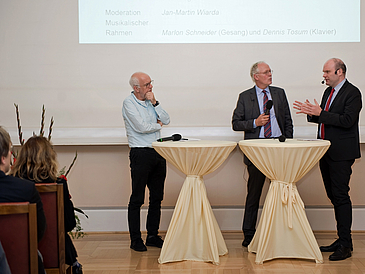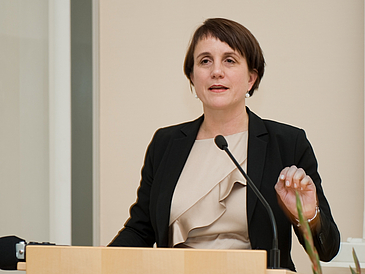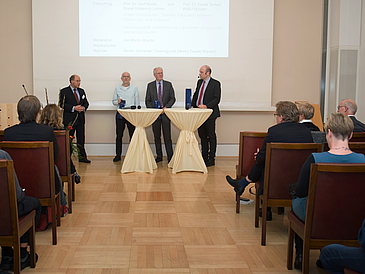Whether teacher training, artificial intelligence or the future of industrial production: The Bremen University Talks – BUG for short – make a decisive contribution to prompting debate on socially relevant topics. This year, the event which is organized jointly by the Wolfgang Ritter Foundation, the University of Bremen and the friends of the University association, unifreunde, took place for the 30th time. This year, too, it once again achieved its goal of giving new impulses and stimulating a dialogue between science, politics, business and society on a national and international level. The topic of teacher education was hotly debated.
Thanks to the organizers
“I thank the organizers that BUG has again provided us with an opportunity to exchange views with renowned experts from all over Germany and abroad," said Professor Sabine Doff at the end of the two-day event. She is the director of the Center for Teacher Education and a co-organizer. “We have benefited greatly; I can only urge all members of our university to make use of this offer whenever they can.”
International exchange of views
Under the title “Teacher education: regional - national – global”, around 50 persons associated with the teacher training program of the University of Bremen discussed the complex topic with international guests drawn from the fields of science, education, and politics. In their opening talks held in the historical Schütting building, professors Gert Biesta from Brunel University London and Professor Ewald Terhart (Westfälische Wilhelms-Universität Münster) raised the question of whether teacher education should not be rethought in general. In the four panel discussions held the following day, academics from Germany, Austria, Great Britain and Switzerland engaged in critical discussion on topics of teacher education with participants from the practice and teacher training.
Topics of particular heated debate were, for example: How much research can be feasibly tolerated during teacher training? Was the PISA study a timely wakeup for Bremen or simply harmful? Do career changers in the teaching profession endanger quality or do they rather present an opportunity? Should we put teacher training at the center of university education rather than on the sidelines? What is the impact of digitalization and migration on teacher education and careers? Is it still in keeping with the times that Germany is the only country to have a two-phase education comprising university studies and a long period of practical in-school training, or is it a developing country by international standards?
The next topic will be populism
The Bremen University Talks will remain highly topical next year as well: In the light of social developments, the subject of populism will be the focus of next year’s event. Further information on the Bremen University Talks can be found at www.uni-bremen.de/bug.
If you would like to have more information on this topic, feel free to contact:
University of Bremen
UniTransfer
Dr. Christina Jung
Phone: 0421-218-60336
email: christina.jungprotect me ?!vw.uni-bremenprotect me ?!.de



